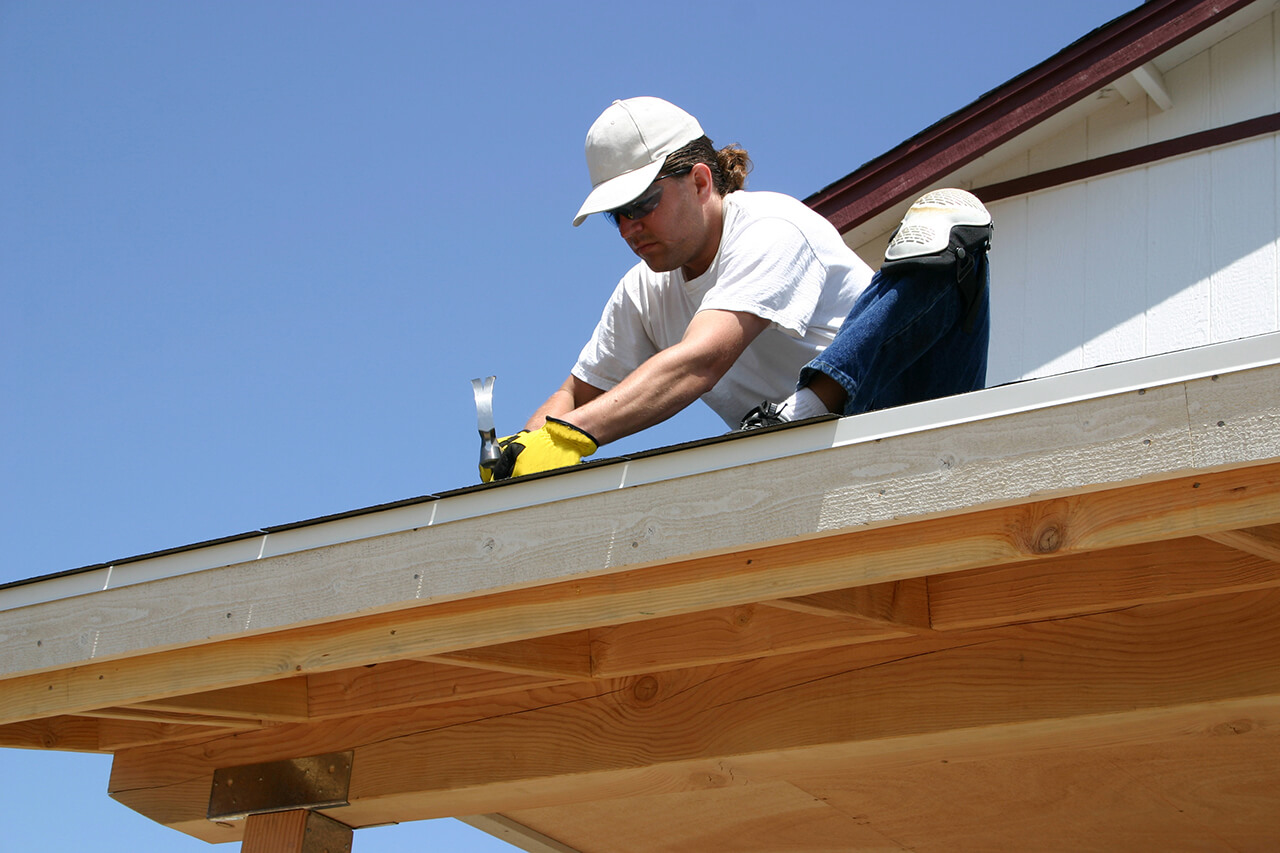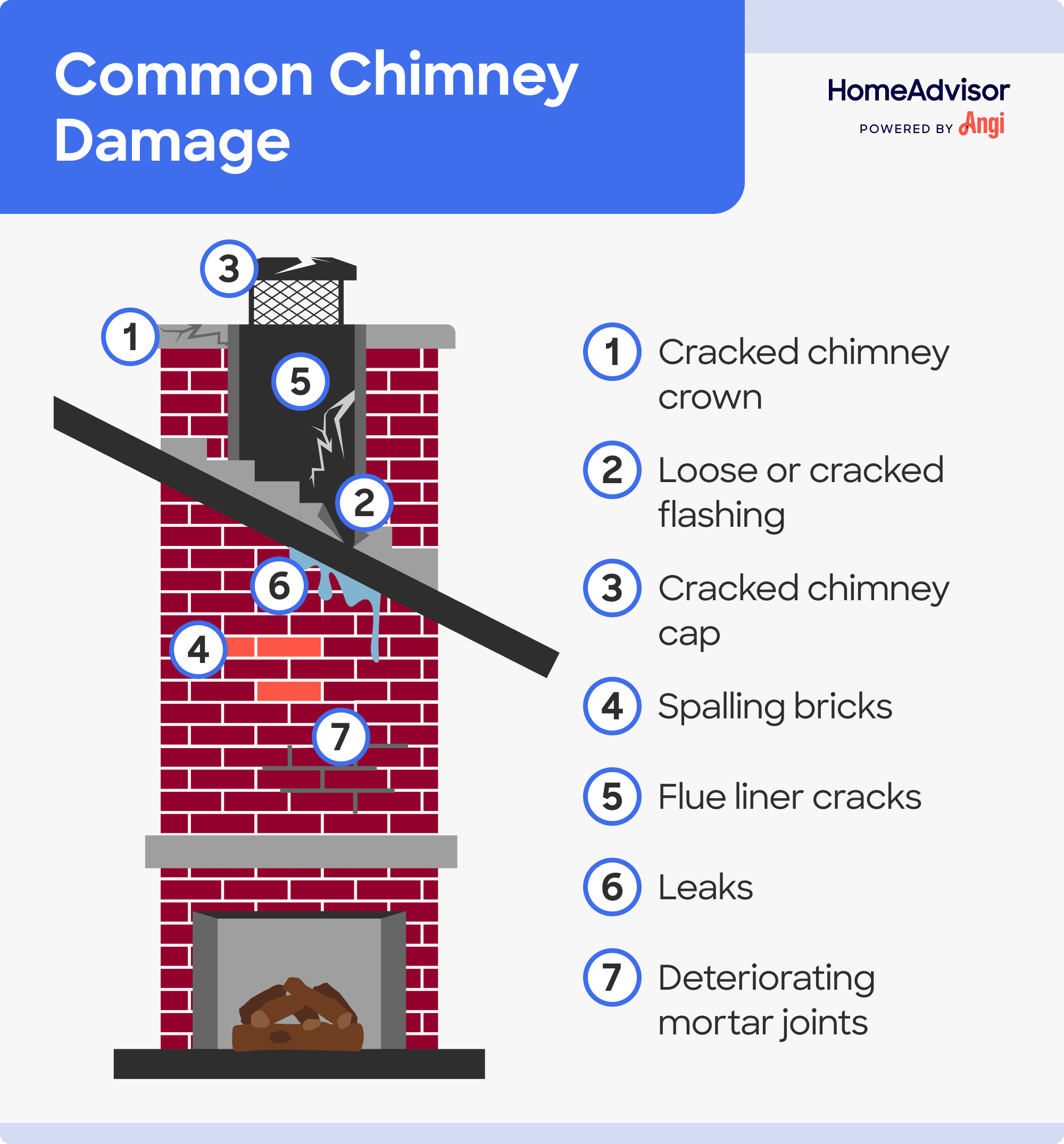
Use this guide to budget for roof repair costs based on factors such as roof condition, materials, size, repair type and severity, and more.
The average cost of chimney repairs is $455


Most homeowners spend between $160 and $750 for chimney repairs, with an average cost of $455.
The top cost factors include damage extent, repair type, and chimney material.
Hiring a chimney professional promptly helps maintain safety and reduce long-term expenses.
This article was updated using automation technology and thoroughly reviewed for accuracy by HomeAdvisor Editor Ryan Noonan.
Chimney repairs cost most homeowners an average of $455, though prices fall between $160 and $750. Your total costs depend on the type of repair required, local labor rates, and the style of your chimney. Budgeting for professional help ensures structural integrity and prevents costly damage. Thorough planning encompasses every aspect of your system, safeguarding both your comfort and your finances.
Chimney repair costs vary widely based on several factors, and understanding these factors helps you budget effectively and hire the right professional for your specific chimney repair needs. Here are the factors that combine to inform your total cost:
Extent of Damage: Minor cracks are less expensive to fix than major structural issues.
Type of Repair Needed: Specific repairs, such as crown or flue repairs, impact the overall cost.
Chimney Material: Repair costs differ for brick, stucco, metal, or prefab chimneys.
Foundation Issues: Problems with your home’s foundation can significantly increase repair expenses.
Labor: A chimney sweep will identify your repair needs and will charge between $130 and $380 for their work.

Your total chimney repair costs will depend largely on the type of repairs required. Chimneys can develop various issues that affect their performance and safety. While you might notice some problems yourself, a professional can accurately diagnose and address them. Here are a few common chimney repairs and their costs.
Repairing a chimney crown costs between $150 and $350. The chimney crown is the slab of concrete at the top of your chimney (not to be confused with the chimney cap). It protects the brick and mortar from weather damage and keeps pests out. Additionally, it prevents sparks from escaping your chimney and landing on your roof, reducing fire risks.
Replacing a damaged crown can cost up to $3,000. Cracks allow water to seep into the brickwork and framing, so schedule the repair as soon as you notice an issue. Acting early keeps repair bills lower and shields your home from costly water damage.
On average, you can expect to pay $300 for a chimney cap replacement. The cover (sometimes called a cap) protects your flue and is at the very top of the chimney.
Fixing cracked tiles in your flue runs from $65 to $100 per square foot. A few broken tiles may cost $200 to $400, but more extensive damage may necessitate replacing the entire flue liner. Fix cracked flue tiles immediately—tiny gaps can allow toxic fumes to seep into your home. A patch is usually a stop-gap; plan on replacing the liner down the road to keep your fireplace running safely and efficiently. Installing (or replacing) a chimney flue liner costs between $625 and $7,000.
Repairing a leaking chimney costs between $150 and $500. Water can enter through cracks in the chimney, leading to mold growth and wood rot. These cracks often occur at the roofline when flashing or sealants fail, allowing rainwater to seep into the building. Sealing these cracks with mortar prevents further water damage and protects your home from further deterioration.
The material your chimney is made of will affect your final repair cost. Here’s how these costs break down.
| Material | Cost Range |
|---|---|
| Brick | $300–$15,000 |
| Stucco | $900–$4,000 |
| Metal | $250–$1,200 |
Repairing brick chimneys costs an average of $300 to $15,000. More extensive damage could run upwards of $4,000, and a total chimney replacement can reach up to $15,000.
Keep in mind that some contractors may charge more for projects above 10 feet. Brick chimney work might cost less if the location for repairs is closer to the ground.
Depending on the extent of the damage, repairing a stucco chimney costs between $900 and $4,000. Stucco chimneys can develop cracks and water damage that require professional repair to restore their appearance and structural integrity.
Repairing a metal chimney will cost between $250 and $1,200. This material is highly durable but can dent during major storms. If you only need to replace the flashing on a metal chimney, the cost is $300.
A prefabricated chimney will cost you between $250 and $1,200, as it is often made of metal and shares similar repair costs. This price range reflects a general range for minor issues to severe damage.
In addition to the common chimney problems mentioned above, your chimney may suffer from other issues. Here are some additional repair costs to consider.
Minor wood-rot patches cost a few hundred dollars, but widespread damage can range from $2,500 to $4,000. If the framing is beyond repair, a complete chimney replacement—about $10,000—may be the safest play.
Chimney parging coats the smoke chamber with mortar and costs $1,000 to $2,000. It smooths over the smoke chamber so that any residue in uneven crevices doesn’t leak out or combust.
Repointing brick costs between $4 and $25 per square foot. The mortar between bricks wears down over time; repointing repairs the mortar to prevent your chimney from collapsing.
Annual chimney cleaning and maintenance are essential for ensuring your chimney operates safely and efficiently. Regular visits from a professional chimney sweep help prevent the buildup of soot and creosote, reducing the risk of chimney fires and ensuring proper ventilation.
Professional chimney sweeps charge $130 to $380. Book a cleaning at least once a year to clear creosote, catch minor issues early, and prevent more significant repair bills later.
Skip the DIY ladder climb—chimney repair is specialty work best left to certified masons and sweeps. While certified chimney sweeps handle cleaning and routine inspections, chimney repairs should be performed by specialized masonry contractors. Chimney repair professionals possess the expertise to safely repair, rebuild, or replace your chimney, ensuring its structural integrity and preventing future hazards.
Line up a local chimney repair professional to keep your chimney—and everyone under your roof—safe and draft-ready.
No place is more important than your home, which is why HomeAdvisor connects homeowners with local pros to transform their houses into homes they love. To help homeowners prepare for their next project, HomeAdvisor provides readers with accurate cost data and follows strict editorial guidelines. After a project is complete, we survey real customers about the costs to develop the pricing data you see, so you can make the best decisions for you and your home. We pair this data with research from reputable sources, including the U.S. Bureau of Labor Statistics, academic journals, market studies, and interviews with industry experts—all to ensure our prices reflect real-world projects.
From average costs to expert advice, get all the answers you need to get your job done.

Use this guide to budget for roof repair costs based on factors such as roof condition, materials, size, repair type and severity, and more.

Use this guide to budget for chimney replacement costs based on factors including materials, rebuilding tasks, repairs, and more.

Need fascia and soffit repairs? Hiring a pro ensures proper installation, protects against pests, and prevents structural damage. Learn about common warning signs, material options, and how fascia and soffits safeguard your home from moisture.

Learn how to budget for a new fence by exploring cost factors such as the fence size, height, posts, gates, style, and labor requirements.

Budget for how much wood-burning stove installation costs based on factors like wood costs, ventilation, chimney condition, professional labor, and more.